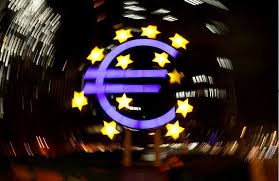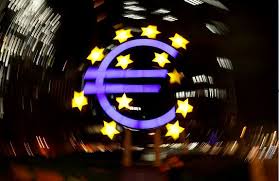
Inflation in the eurozone jumped to another record high in May, increasing government bond yields as markets interpreted the data as a challenge to the European Central Bank's assumption that gradual interest rate hikes beginning in July will be sufficient to slow fast price growth.
Inflation in the 19 eurozone countries surged to 8.1 per cent in May, up from 7.4 per cent in April, exceeding expectations for 7.7 per cent as price increases broadened, indicating that it is no longer only energy driving the headline figure.
"The inflation problem in the euro area is getting worse," said Commerzbank economist Christoph Weil. "Today's price data once again increase the pressure on the ECB to end its ultra-loose monetary policy."
Government bond rates in the Eurozone surged as a result of the report, which raised expectations that the ECB would speed its policy tightening course.
Prices have risen dramatically across Europe in the last year, initially due to supply chain issues following the epidemic, then due to Russia's war in Ukraine, implying that a new period of rapid price growth is now washing away a decade of ultra-low inflation.
Though headline inflation is now four times the ECB's target of two percent, ECB policymakers may be more concerned by the quick rise in underlying prices, which suggests that what was formerly considered as a transient leap is now becoming embedded.
Inflation excluding food and energy prices, which the ECB constantly monitors, rose to 4.4 per cent year on year from 3.9 per cent in April, while an even narrower measure, which also includes alcohol and tobacco, rose to 3.8 per cent year on year from 3.5 per cent in April.
"We mechanically update our euro area inflation forecast, and now expect euro area core inflation to peak at 3.9% year-on-year in June and headline inflation to peak at 9.3% year-on-year in September," Goldman Sachs said in a research note.
In order to contain inflation, ECB President Christine Lagarde and Chief Economist Philip Lane have already announced 25 basis point increases in the deposit rate, which is at minus 0.5 per cent, for July and September.
However, several officials and economists are sceptical that this will be enough, especially given underlying inflation shows no indications of abating.
The difficulty is that once high energy prices enter the system, inflation spreads and becomes entrenched, eventually perpetuating itself through a price-wage spiral.
While proof of such a tendency is still lacking, a series of data points ranging from an increase in negotiated salaries to expanding core inflation point to a growing risk.
That is why the central bank governors of Austria, the Netherlands, and Latvia have all stated that a rate hike of 50 basis points should be considered in July.
The Dutch central bank's president, Klaas Knot, even stated that inflation expectations are now at the upper end of what may still be characterised as "anchored," implying that people and investors may soon begin to doubt the ECB's willingness to contain price growth.
The ECB will meet next on June 9, when it will formally terminate its bond-purchasing programme at the end of the month and continue to indicate rate hikes.
(Source:www.business-standard.com)
Inflation in the 19 eurozone countries surged to 8.1 per cent in May, up from 7.4 per cent in April, exceeding expectations for 7.7 per cent as price increases broadened, indicating that it is no longer only energy driving the headline figure.
"The inflation problem in the euro area is getting worse," said Commerzbank economist Christoph Weil. "Today's price data once again increase the pressure on the ECB to end its ultra-loose monetary policy."
Government bond rates in the Eurozone surged as a result of the report, which raised expectations that the ECB would speed its policy tightening course.
Prices have risen dramatically across Europe in the last year, initially due to supply chain issues following the epidemic, then due to Russia's war in Ukraine, implying that a new period of rapid price growth is now washing away a decade of ultra-low inflation.
Though headline inflation is now four times the ECB's target of two percent, ECB policymakers may be more concerned by the quick rise in underlying prices, which suggests that what was formerly considered as a transient leap is now becoming embedded.
Inflation excluding food and energy prices, which the ECB constantly monitors, rose to 4.4 per cent year on year from 3.9 per cent in April, while an even narrower measure, which also includes alcohol and tobacco, rose to 3.8 per cent year on year from 3.5 per cent in April.
"We mechanically update our euro area inflation forecast, and now expect euro area core inflation to peak at 3.9% year-on-year in June and headline inflation to peak at 9.3% year-on-year in September," Goldman Sachs said in a research note.
In order to contain inflation, ECB President Christine Lagarde and Chief Economist Philip Lane have already announced 25 basis point increases in the deposit rate, which is at minus 0.5 per cent, for July and September.
However, several officials and economists are sceptical that this will be enough, especially given underlying inflation shows no indications of abating.
The difficulty is that once high energy prices enter the system, inflation spreads and becomes entrenched, eventually perpetuating itself through a price-wage spiral.
While proof of such a tendency is still lacking, a series of data points ranging from an increase in negotiated salaries to expanding core inflation point to a growing risk.
That is why the central bank governors of Austria, the Netherlands, and Latvia have all stated that a rate hike of 50 basis points should be considered in July.
The Dutch central bank's president, Klaas Knot, even stated that inflation expectations are now at the upper end of what may still be characterised as "anchored," implying that people and investors may soon begin to doubt the ECB's willingness to contain price growth.
The ECB will meet next on June 9, when it will formally terminate its bond-purchasing programme at the end of the month and continue to indicate rate hikes.
(Source:www.business-standard.com)





